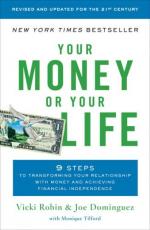
|
| Name: _________________________ | Period: ___________________ |
This test consists of 15 multiple choice questions and 5 short answer questions.
Multiple Choice Questions
1. How many credit cards should program participants keep?
(a) One for business use, one for personal use, and one for emergencies.
(b) One, to be used only in emergencies.
(c) None.
(d) One for everyday use and one for emergencies.
2. The numbers along the y-axis should increase by what increment?
(a) 1,000 or 2,000.
(b) 1 or 2.
(c) 10 or 20.
(d) 100 or 200.
3. What is one advantage of estimating the likely timing of the crossover point?
(a) People spend less.
(b) People may become more eager about going to work and doing a good job.
(c) People retire early.
(d) People tend to leave their current job for a more enjoyable one.
4. What percentage of useful life objects could people add if they were not so anxious to replace them?
(a) Ten percent.
(b) Twenty to fifty percent.
(c) One hundred percent.
(d) Fifty to eighty percent.
5. What is the best method of choosing which expenses to reduce or eliminate?
(a) Use answers to the three questions from Chapter 4.
(b) Compare income to expenses on the wall chart.
(c) Use answers to the three questions from Chapter 3.
(d) Add up the plusses and minuses on the monthly chart.
6. How should investment income be tracked?
(a) Subtracted from monthly expenses.
(b) Combined with other income.
(c) Combined with monthly expenses.
(d) Separately from other income.
7. When can program participants consider retirement?
(a) When total income exceeds expenses.
(b) After working for 20 years in the same field.
(c) After reaching the crossover point.
(d) At age 65.
8. A line should be drawn connecting the current month's income to what?
(a) The previous month's expenses.
(b) The previous year's income.
(c) The previous month's income.
(d) The current month's expenses.
9. What is the true definition of work?
(a) It varies depending on who is defining it.
(b) Full-time employment.
(c) Life energy spent.
(d) Anything that is not enjoyable.
10. What is the best thing to do with the interest received?
(a) Purchase rental properties.
(b) Reinvest it.
(c) Put the money under a mattress for a rainy day.
(d) Purchase a larger home as a hedge against inflation.
11. How does eating a proper diet make sense financially?
(a) Eating three meals a day saves money.
(b) Losing weight means no money spent on gym memberships.
(c) Eating good foods can prevent illnesses and reduce medical costs.
(d) Eating less saves money.
12. What is the main pitfall of combining work with true passion or enjoyment?
(a) Having to compromise in order to satisfy someone else.
(b) Enjoyment goes against the puritan work ethic.
(c) Passion doesn't always make up for lack of talent.
(d) Enjoyable jobs don't command respect.
13. What should frugal people research before purchasing items?
(a) Color, style, and multiple use.
(b) Value, quality, durability, and multiple use.
(c) Value, quality, and availability.
(d) Popularity, quality, durability, and multiple use.
14. What is Step 8 of the program?
(a) Estimate when the crossover point will take place.
(b) Retire.
(c) Further reduce monthly expenses.
(d) Track investment income.
15. What is the recommended size of the wall chart?
(a) From 18 to 24 inches wide, and from 22 to 36 inches tall.
(b) From 18 to 22 inches wide, and from 24 to 36 inches tall.
(c) From 18 to 22 inches tall, and from 24 to 36 inches wide.
(d) From 18 to 24 inches tall, and from 22 to 36 inches wide.
Short Answer Questions
1. What is a major advantage of separating employment from passion?
2. Statistically, how many Americans are overweight?
3. What is the main purpose of the wall chart?
4. What do the authors warn job-hunters to avoid?
5. What generally happens to monthly expenses, when tracked by program participants?
|
This section contains 660 words (approx. 3 pages at 300 words per page) |

|




